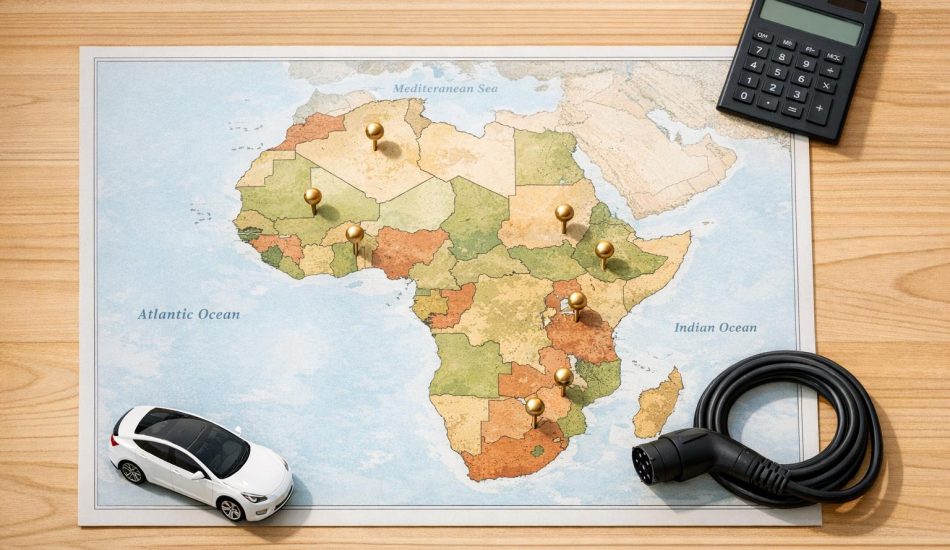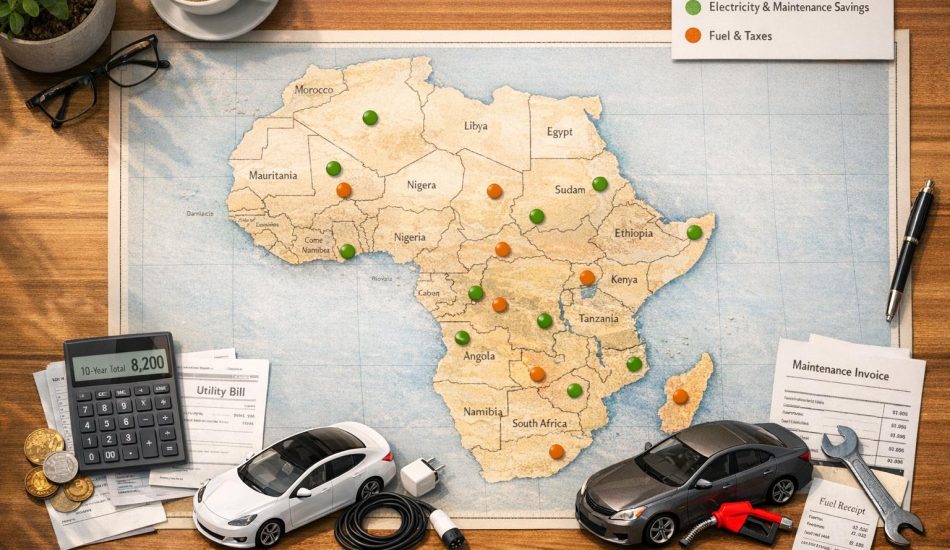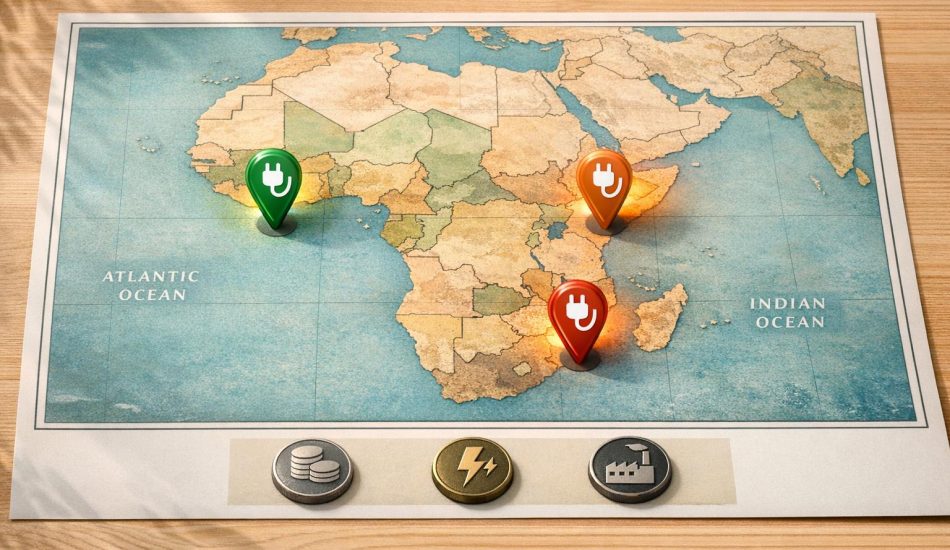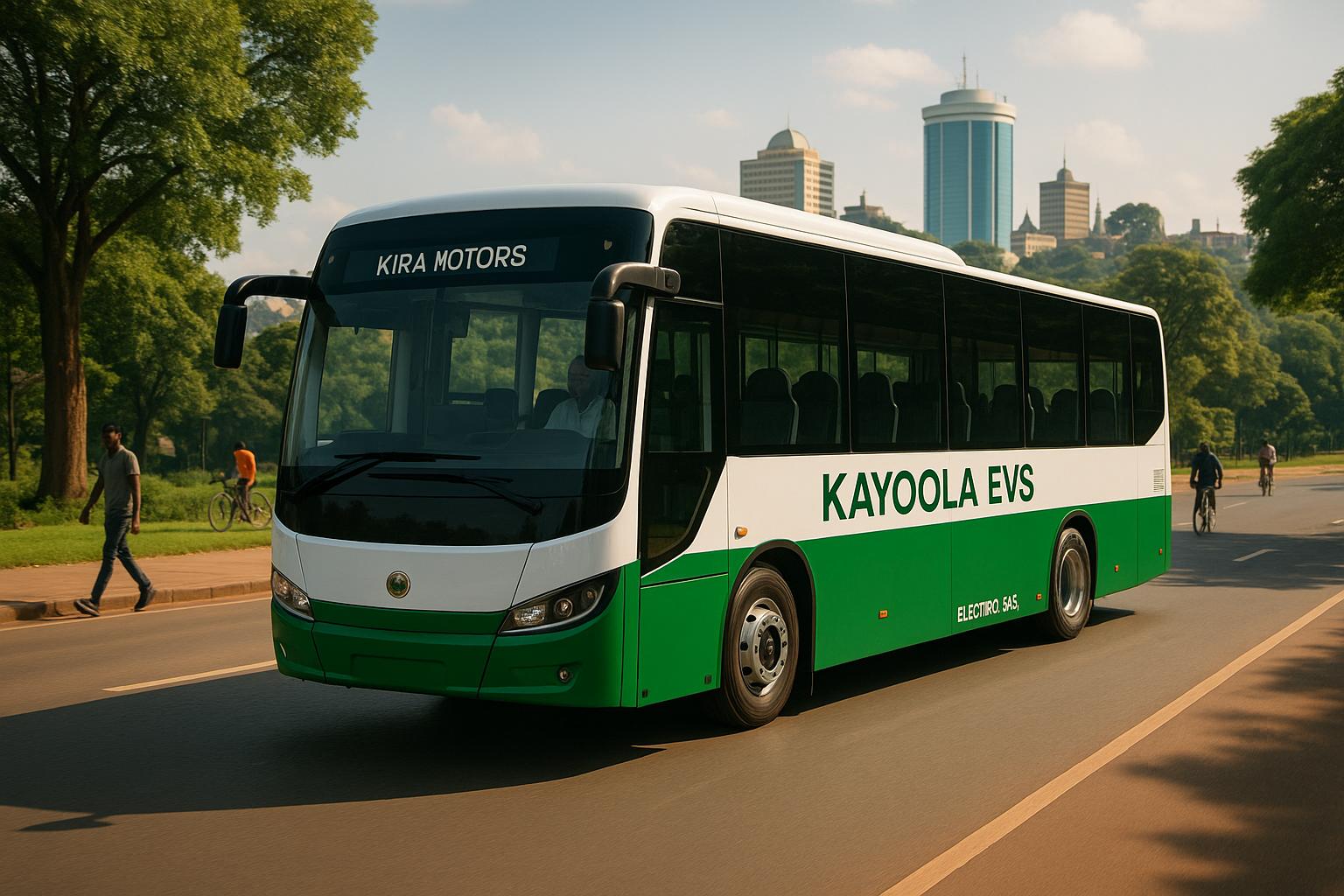
Uganda is stepping into the future of transportation with the launch of Kayoola EVS electric buses by Kiira Motors Corporation (KMC). These buses are designed to address Kampala’s urban transit challenges while reducing air pollution and supporting local manufacturing. Here’s what you need to know:
- Eco-Friendly Impact: Each bus eliminates 181 metric tons of CO₂ annually, contributing to cleaner air in Kampala.
- Cost Efficiency: Operating costs are UGX 320 per kilometer, significantly lower than diesel buses at UGX 1,670 per kilometer.
- Local Manufacturing: Built with 21% locally sourced materials, these buses support Uganda’s economy and reduce reliance on imports.
- Passenger Comfort: Features include Wi-Fi, USB charging ports, cashless payment systems, and a low-floor design for easy access.
- Economic Growth: The initiative is expected to create over 14,000 jobs and reduce Uganda’s $730 million annual vehicle import bill.
With a goal to produce 10,000 electric vehicles annually by 2024, Uganda is positioning itself as a leader in electric mobility. The Kayoola EVS is more than just a bus – it’s a step toward cleaner cities, economic growth, and a sustainable future.
Kayoola EVS Bus Features and Specifications
Technical Specifications and Performance
The Kayoola EVS buses are designed to meet the demands of Kampala’s busy urban transport system. Powered by an electric motor that generates up to 245 kW, these buses provide the acceleration and hill-climbing capability needed for city driving. Equipped with a high-capacity 560 kWh battery, they can handle extended daily routes with ease. The range varies by model, giving operators flexibility to match different route requirements.
| Model | Dimensions | Range | Passenger Capacity |
|---|---|---|---|
| Kayoola EVS 8m | 26.2’×7.8’×10.0′ | 124 miles | 56 (28 seated/28 standing) |
| Kayoola EVS 10m | 34.4’×8.4’×10.4′ | 155 miles | 70 (32 seated/38 standing) |
| Kayoola EVS 12m | 40.4’×8.4’×10.5′ | 186 miles | 90 (42 seated/48 standing) |
| Kayoola Tour Bus 6m | 19.2’×6.1’×7.2′ | 62 miles | 20 |
The 2024 models expand the lineup further, offering options from compact 19.7-foot buses with 15 seats to larger 59-foot vehicles capable of carrying up to 120 passengers. These buses are engineered to maintain consistent performance throughout long operating hours, ensuring reliability for commuters.
With these features, the Kayoola EVS buses promise a smooth and efficient ride for passengers, tailored to the needs of city transit systems.
Passenger-Focused Features
The Kayoola EVS buses don’t just deliver on performance – they also prioritize the comfort and convenience of passengers. Onboard amenities like Wi-Fi, USB charging ports, and infotainment systems help commuters stay connected and entertained during their journeys. Safety is a key focus, with CCTV cameras installed to monitor passenger areas, while e-ticketing and cashless payment systems make boarding faster and more efficient, especially during peak hours.
The low-floor design is another standout feature, making boarding and exiting easier for everyone, particularly for elderly passengers and individuals with disabilities. By incorporating these inclusive design elements, the buses ensure accessibility for all commuters.
Fred Bamwesigye, Director General of the Uganda Civil Aviation Authority (UCAA), highlighted the transformative impact of these buses when receiving the first delivery:
"We are proud to receive the first of six electric buses, fully embracing this transformative innovation"
He also described the buses as:
"a symbol of national pride, sustainability, and our commitment to better airport ground services"
Local Manufacturing and Materials
What sets the Kayoola EVS buses apart is their emphasis on local manufacturing. Bamboo flooring, a traditional Ugandan material, is used in the buses, blending modern functionality with local craftsmanship. Additionally, much of the structure and body are made from locally sourced materials, reducing reliance on imports and supporting Uganda’s domestic suppliers.
Paul Isaac Musasizi, CEO of Kiira Motors Corporation (KMC), underscored this focus on local involvement:
"There is a lot of sourcing of materials locally for the construction of the Kiira Vehicle Plant, but more importantly, this project is being undertaken by Ugandans"
The Kiira Vehicle Plant is set to produce 22 vehicles per day in its first phase, which translates to an annual output of 5,000 vehicles. Localizing parts production could save Uganda an estimated $450 million each year on imports. To further this effort, KMC has acquired land for an Automotive Industrial and Technology Park. Uganda’s rich mineral resources also offer an opportunity to manufacture vehicle components domestically, reducing costs while adding value to exports.
Benefits of Kayoola EVS Buses for Environment and Economy
Impact on Air Quality
Kampala faces a serious air pollution problem, posing significant risks to public health. In 2024, the city recorded air pollution levels of 41 micrograms per cubic meter – eight times higher than the World Health Organization‘s recommended safe limit of 5 micrograms per cubic meter. A major contributor to this pollution is transportation, with the city reporting over 503g/km of high-carbon emissions from vehicles.
The Kayoola EVS buses present a promising solution. These electric buses produce zero greenhouse gas emissions during operation, reducing CO₂ output by 181 metric tonnes per bus compared to diesel alternatives. If widely adopted, these buses could help prevent 3,700 premature deaths by 2030 . Kiira Motors highlights this transformative potential:
"The operation of the #KayoolaEVS has zero greenhouse emissions. This implies its adoption will contribute to the improvement of Air Quality in Kampala one of the most polluted cities in Africa with over 503g/km of high-carbon transport-based emissions."
This shift towards cleaner transportation not only benefits the environment but also offers significant economic advantages.
Cost Savings
Switching to electric buses also brings substantial financial benefits. Operating the Kayoola EVS costs just UGX 320 per kilometer, compared to UGX 1,670 for diesel buses. Paul Isaac Musasizi, CEO of Kiira Motors Corporation, underscores these savings:
"Compared to fuel-powered vehicles, users save over 78% in energy costs and more than 46% in annual maintenance expenses. This electric bus is not only a smart mobility solution, but a smart economic one as well."
Electric buses are simpler mechanically, with fewer moving parts than diesel engines, which translates to lower maintenance needs. This results in a 46% reduction in annual maintenance costs compared to traditional fuel-powered buses.
Beyond individual cost savings, the economic implications for Uganda are profound. The country spends roughly $2 billion annually on energy imports and $730 million on vehicle imports. By transitioning to locally manufactured electric buses, Uganda can reduce its reliance on imported fossil fuels and vehicles, keeping more money circulating within the domestic economy.
Comparison with Diesel Buses
The advantages of the Kayoola EVS buses over diesel buses span both operational efficiency and environmental impact. Here’s a breakdown:
| Factor | Kayoola EVS Bus | Diesel Bus |
|---|---|---|
| Cost per Km | UGX 320 | UGX 1,670 |
| Greenhouse Gas Emissions | Zero during operation | Approximately 181 metric tonnes CO₂ |
| Energy Cost Savings | 78% lower than diesel | – |
| Annual Maintenance Costs | 46% lower than diesel | – |
| Noise Pollution | Silent operation | High noise levels |
| Fuel/Energy Source | Electricity (potentially renewable) | Imported diesel fuel |
Electric buses also align with Uganda’s renewable energy potential. Unlike diesel buses that rely on imported fossil fuels, electric buses can be powered by locally generated electricity, including renewable sources like hydroelectric power. Kiira Motors emphasizes this point:
"The Kayoola EVS Bus has an operating cost per KM of 320 shillings as compared to a Diesel Bus Equivalent with Cost per KM of 1,670 shillings implying better energy efficiency on the backdrop of enhanced environmental stewardship."
In short, the Kayoola EVS buses are more than just a green alternative – they’re a cost-effective and practical solution for transport operators. With lower operating costs, reduced maintenance needs, and freedom from fluctuating fuel prices, these buses represent a smart investment for both the environment and the economy.
How Kayoola EVS Buses Support Uganda’s Urban Development
Tackling Urban Traffic Challenges
Kampala’s notorious traffic congestion disrupts daily life and productivity, but the Kayoola EVS buses present a practical way forward. With their capacity for mass transportation and efficient design, these buses are tailored to meet the demands of busy urban routes.
Available in various sizes, the buses are built to handle city commutes without concerns about range limitations. Their range ensures consistent service, and integrated digital systems streamline boarding, cutting down on delays at stops. This not only improves the flow of traffic but also creates a ripple effect of economic and infrastructural growth.
For perspective, consider the Dar es Salaam Bus Rapid Transit (DART) system, which slashed travel time from three hours to just 45 minutes on a 20-kilometer (about 12.4 miles) route. While Kampala’s results may vary, the Kayoola EVS buses set the stage for similar progress. Designed by Kiira Motors, these buses replace imported alternatives with locally made electric vehicles, aligning perfectly with Uganda’s urban transport needs.
Boosting Jobs and Strengthening the Local Economy
The Kayoola EVS initiative is more than just a transportation solution – it’s a catalyst for Uganda’s manufacturing sector. The Kiira vehicle plant in Jinja is projected to create over 14,000 jobs, both directly and indirectly.
By December 2024, Uganda will have the capability to produce up to 10,000 electric vehicles annually. Impressively, 21% of the materials used in these buses are sourced locally. This approach not only supports skills development and technology transfer but also aligns with the "Buy Uganda, Build Uganda (BUBU)" policy, which aims to transform the economy by 2040.
The impact extends beyond Uganda’s borders. The Kiira plant has already signed an agreement to export 3,700 electric buses to West Africa, positioning Uganda as a regional hub for electric vehicle production.
In June 2025, Kiira Motors Corporation delivered the first six Kayoola EVS buses to the Uganda Civil Aviation Authority (UCAA). This partnership underscores the commitment of Ugandan institutions to homegrown solutions. Deputy Speaker of Parliament Thomas Tayebwa highlighted this sentiment:
"It is time to believe in our own. What we are importing from abroad is not even comparable. These are home-grown solutions, built by our own people, for our own needs."
Paul Isaac Musasizi, CEO of Kiira Motors Corporation, elaborated on the broader potential:
"We are optimistic that the introduction of this new model will create significant opportunities not just for commuters, but also for transport entrepreneurs because the vehicle supports a more sustainable and profitable business model, thanks to its use of affordable energy."
By investing in local production, Uganda is not just advancing its mobility goals but also reinforcing its economic foundation.
Advancing Uganda’s Electric Mobility Goals
The Kayoola EVS buses align with Uganda’s broader electrification and sustainability objectives. As part of the country’s strategy to achieve Net-Zero Carbon Emissions by 2050, these buses play a pivotal role in reducing the carbon footprint of urban transportation.
With 90% of Uganda’s energy derived from renewable sources, the buses run entirely on clean electricity, maximizing environmental benefits. Additionally, Uganda’s energy policy supports the development of legal frameworks and infrastructure to promote e-mobility.
The buses are also cost-efficient, offering over 78% savings in energy costs and cutting annual maintenance expenses by 46%. Fred Bamwesigye, Director General of UCAA, highlighted their alignment with national goals:
"The shift from diesel-powered vehicles to locally manufactured electric buses reflects Uganda Civil Aviation Authority’s strong alignment with Uganda’s Net-Zero Carbon Emissions Target by 2050 and the Buy Uganda, Build Uganda (BUBU) policy that aims to drive Uganda’s economic transformation by 2040."
Eng. Paul Isaac Musasizi, CEO of Kiira Motors Corporation, emphasized the regional significance:
"This initiative aims to lead the e-mobility revolution and the decarbonization of transportation in East Africa. By localizing the development and deployment of electric vehicles, Kiira Motors Corporation seeks to enhance environmental sustainability and stimulate economic growth within the region."
Deputy Speaker Thomas Tayebwa added a broader call to action:
"Let us take advantage of our vast resources and integrate technology in public spaces, schools, hospitals, and industries to ensure we do not fall behind."
sbb-itb-99e19e3
Growing Electric Vehicle Adoption in Africa with EV24.africa
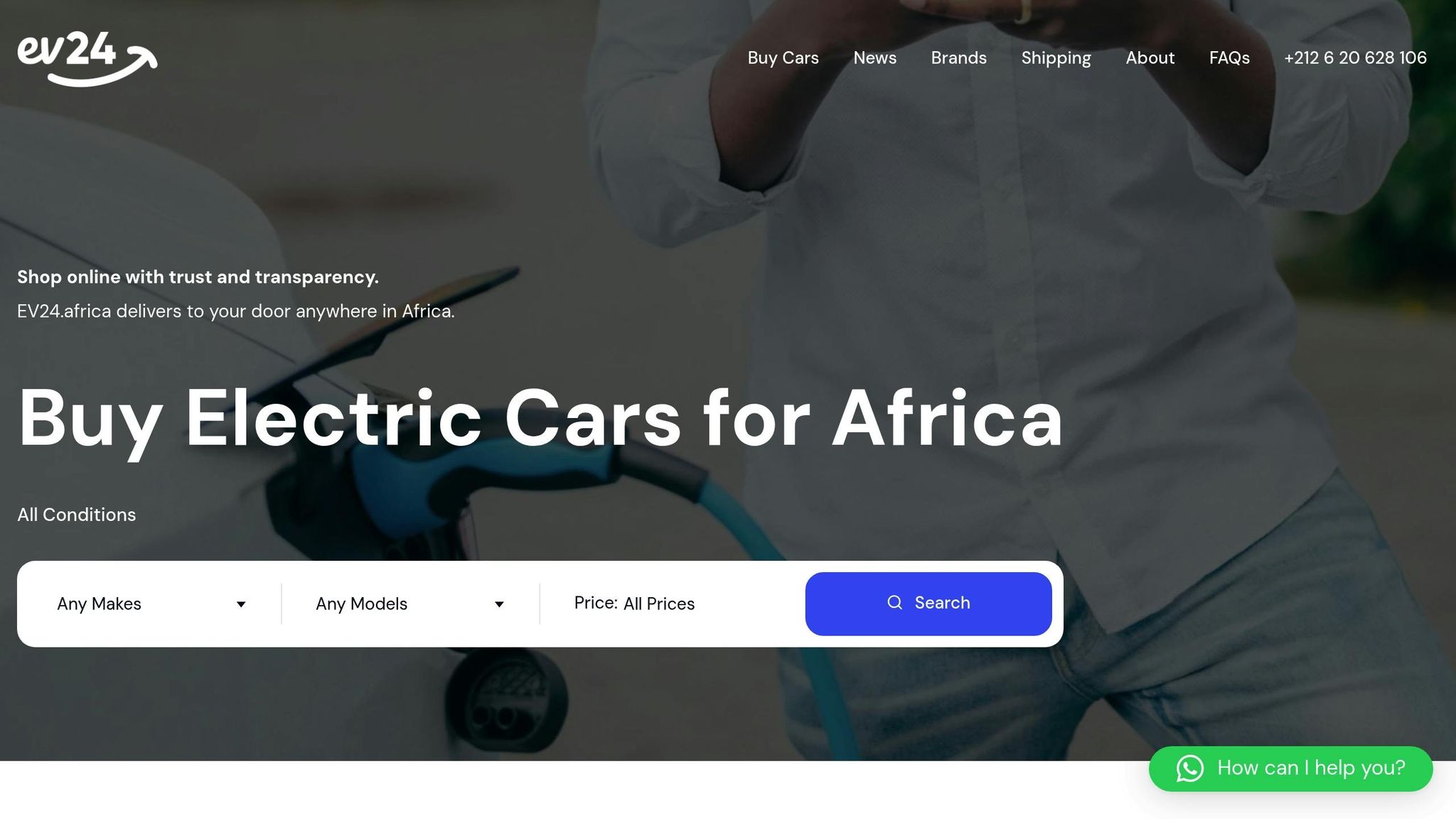
Africa’s Move to Electric Vehicles
Africa’s relatively low car ownership – Ethiopia, for example, has just 10 cars per 1,000 people compared to France’s 668 per 1,000 – makes it a region ripe for growth as household incomes increase. However, the shift to electric vehicles (EVs) isn’t without its challenges.
Political, economic, and social factors all play a role in shaping how quickly EVs are adopted. Access to cheap oil, for instance, can dampen enthusiasm for switching to electric alternatives. In addition, many areas lack the robust electrical infrastructure needed to support widespread EV use. That said, renewable microgrids powered by solar and wind energy could offer a way around these limitations, provided there’s adequate investment upfront. With the global push toward phasing out internal combustion engines, EVs are becoming the logical choice for new car purchases across the continent. One major advantage of EVs is their ability to function without heavily centralized infrastructure – electricity can be generated locally, which is a huge plus for regions rich in renewable energy sources.
Government initiatives are also playing a role. For example, Uganda has introduced tax exemptions on 100% electric vehicles, waiving VAT and customs duties to encourage adoption.
Amid this evolving landscape, platforms like EV24.africa are stepping in to drive Africa’s transition to electric mobility.
How EV24.africa Supports E-Mobility
As Africa begins to embrace the electric vehicle revolution, EV24.africa is making it easier for individuals and businesses to navigate the EV buying process. The platform complements local efforts, such as Uganda’s Kayoola EVS buses, while connecting African markets to global EV innovations.
EV24.africa serves as a pan-African online marketplace designed to simplify EV adoption. It removes traditional barriers by offering a seamless, start-to-finish solution for EV buyers – from choosing a vehicle to receiving it at their doorstep.
"We simplify the process of importing and buying electric vehicles in Africa. Our expertise ensures a seamless, transparent, and stress-free experience, so you can focus on driving the future of mobility."
The platform provides access to over 200 EV models from more than 25 global brands, including Tesla, BYD, and Volkswagen. Its delivery network spans all 54 African nations, ensuring that even remote areas can benefit from EV adoption. In Uganda, for instance, EV24.africa uses the Port of Mombasa in Kenya as a hub, followed by inland transportation to cities like Kampala, Entebbe, and Gulu.
Beyond delivery, the platform assists with customs clearance, registration, and tax compliance, making the process straightforward. Transparent pricing and flexible financing options further simplify the experience.
Axel Peyriere, CEO of AUTO24.africa, highlights the company’s mission:
"The future of mobility in Africa is electric. EV24.africa is here to make this transition easier by offering a transparent and competitive platform. Electric vehicles are not only an environmentally conscious choice but also a smart economic decision, thanks to lower fuel and maintenance costs."
EV24.africa Services and Features
EV24.africa offers a comprehensive range of services to make owning an electric vehicle easier for African consumers. Their end-to-end approach ensures buyers are supported at every stage, from initial selection to delivery and beyond.
| Service Category | Features | Benefits |
|---|---|---|
| Vehicle Selection | Access to 200+ EV models from 25+ brands | A wide variety of options to suit different needs and budgets |
| Import Management | Help with customs clearance and registration | Simplifies paperwork and ensures compliance with local regulations |
| Shipping & Delivery | RoRo and container shipping to all 54 countries | Flexible options, including port-to-port and door-to-door delivery |
| Financial Services | Transparent pricing and flexible financing | Clear cost breakdowns and accessible payment plans |
| Customer Support | Dedicated help from selection to delivery | Personalized assistance throughout the purchasing process |
| After-Sales Service | Reliable post-purchase support | Ongoing maintenance and servicing for EVs |
The platform also provides detailed, country-specific insights to help buyers understand local import policies, tax benefits, and regulatory requirements.
"At EV24.africa, customer satisfaction is our top priority."
Kayoola EVS – First Ugandan Made Electric Bus
Conclusion
The introduction of Kiira Motors’ Kayoola EVS buses is a significant step forward for Uganda’s urban transportation system. These electric buses, built locally, offer Kampala a practical way to address increasing traffic congestion and harmful air pollution, while also aligning with the country’s economic growth objectives.
Each bus helps cut CO₂ emissions by 181 metric tonnes annually when compared to traditional diesel buses. By 2030, transitioning to electric public transit could save up to 3,700 lives by reducing pollution-related health issues. For a city like Kampala, where urbanization is accelerating, cleaner air means better public health outcomes – a benefit that goes beyond just transportation.
From an economic perspective, the Kayoola EVS buses highlight how African nations can reduce costs over time while creating jobs locally. These buses require less maintenance and offer long-term savings, positioning Uganda as a potential hub for manufacturing electric vehicles and components. This effort aligns with similar advancements across Africa, where the shift to electric mobility is proving both environmentally friendly and economically smart.
Initiatives like the Kayoola EVS are part of a larger movement across the continent. For example, Rwanda’s EV battery lab and Senegal’s Bus Rapid Transit system are paving the way for cleaner and more efficient transportation. Platforms such as EV24.africa are also playing a key role by connecting local manufacturing efforts with the broader push toward electric mobility in Africa.
The success of the Kayoola EVS buses could inspire other African nations to follow suit, moving toward a future where clean and efficient public transit becomes standard. For Uganda, this is more than just a transportation upgrade – it’s a bold step toward becoming a leader in Africa’s electric vehicle transformation.
FAQs
How do the Kayoola EVS electric buses help improve air quality in Kampala?
The Kayoola EVS electric buses are making a noticeable difference in Kampala’s air quality by swapping out diesel-powered vehicles for clean, electric options. With zero tailpipe emissions, these buses help cut down on greenhouse gases and harmful pollutants, making the air safer to breathe.
Beyond just cleaner air, these buses align with Uganda’s push toward greener urban transportation. They’re playing a role in creating a healthier environment and improving the daily lives of people in the city.
What are the economic advantages of manufacturing Kayoola EVS electric buses in Uganda?
Manufacturing Kayoola EVS electric buses within Uganda offers significant economic benefits. For starters, it creates a massive number of jobs and invigorates local industries, giving the economy a much-needed boost. To put it in perspective, this initiative is projected to generate over 500,000 jobs while achieving a 65% local production rate in the electric vehicle industry. This shift reduces reliance on imported goods, keeping more money circulating within the country.
Setting up local facilities for building buses and batteries doesn’t just benefit the transportation sector – it also sparks innovation and encourages entrepreneurship. This creates opportunities for well-paying jobs, including roles that empower women, and helps lower the operational costs of public transport systems. Ultimately, producing these vehicles locally strengthens Uganda’s economic resilience and positions the country as a frontrunner in Africa’s move toward cleaner, more sustainable mobility solutions.
How do the operating costs of Kayoola EVS electric buses compare to traditional diesel buses?
The Kayoola EVS electric buses offer a much more economical alternative to traditional diesel buses. Operating costs average around $0.09 per kilometer, a stark contrast to the $0.46 per kilometer required for diesel buses. This difference adds up to major savings, not just in fuel but also in maintenance.
Choosing electric buses like the Kayoola EVS isn’t just about cutting expenses – it’s also a step toward cleaner, greener urban transportation. It’s a win for both budgets and the environment.


